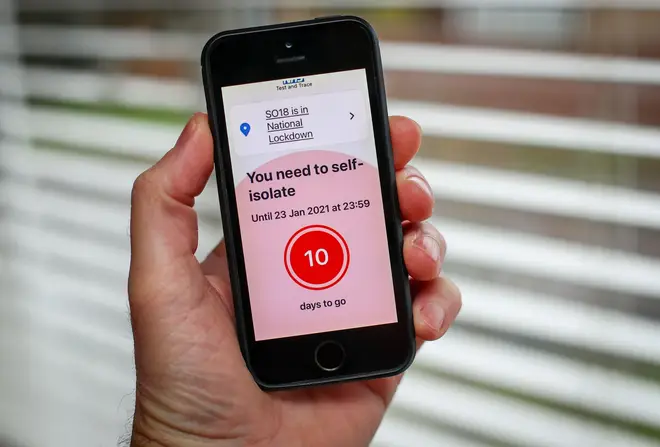
Matthew Wright 7am - 10am
3 August 2021, 06:52

Fewer people will be told to self-isolate by the NHS Covid-19 app following an update to the ‘logic’ which hopes to put an end to the 'pingdemic'.
People are being urged to continue to use the app as changes made from today will result in fewer contacts being advised to self-isolate following a close contact with a positive case.
Health and Social Care Secretary, Sajid Javid, said: “We want to reduce the disruption that self-isolation can cause for people and businesses, while ensuring we’re protecting those most at risk from this virus. This update to the app will help ensure that we are striking the right balance.
“It’s so important that people isolate when asked to do so in order to stop the spread of the virus and protect their communities.”
Read more: Boris Johnson tells LBC the 'pingdemic' will end on August 16
Read more: Pingdemic worsening staff shortages as jobseekers forced to self-isolate
The change will mean fewer contacts that took place when the positive case was unlikely to be at the peak of their infectiousness are advised to self-isolate, reducing the overall number of notifications sent.
Currently, for people who input a positive test but are asymptomatic, the app looks for close contacts five days prior to a positive test. This will be updated based on public health advice to look back at contacts two days prior to a positive test.
The same number of high-risk contacts will be advised to self-isolate.

Boris Johnson tells LBC the 'pingdemic' will end on 16 August
Dr Jenny Harries, head of Test and Trace, said: "Fewer contacts will be contacted, will be advised to isolate, and that is because we will only be contacting those at higher risk where they have had very close contact in the most infectious period of a positive case."
The update to the app comes after concerns were raised about the number of people who were being told to self-isolate.
Read more: London travel: Planned Tube strikes cancelled to allow for more talks
New analysis shows the app continues to play a crucial role in breaking chains of transmission, preventing hospitalisations and saving lives.
In the first three weeks of July, as cases were exponentially rising, the app averted up to 2,000 cases per day, and over 50,000 cases of COVID-19 including chains of transmission assuming 60% compliance with instructions to self-isolate. This is estimated to have prevented 1,600 hospitalisations.

Tory MP says students should be made take vaccine to go on campus
The change to the app has been welcomed by many, with the British Beer and Pub Association (BBPA) saying its research found up to 1,000 pubs have been forced to close temporarily due to large numbers of staff being pinged.
Emma McClarkin, the association's chief executive, said: "On average, each pub forced to temporarily close due to staff being pinged costs £9,500 in lost trade per week and our larger venues much, much more at a critical time in their recovery."
Read more: Covid-19: 'Amber watchlist' idea scrapped by the Government amid criticism
Read more: Tests at stations and on trains find no traces of coronavirus
However, others have said the change does not go far enough, with trade union Unite repeating its call for the automotive and steel sectors to be exempt from self-isolation rules.
"Manufacturing workers share shifts so the two days decision may make little difference. Sometimes whole shifts have been stuck at home as has been the case of late," said Steve Turner, the union's general secretary for manufacturing.
"The costs are horrific to workers and industry alike and there are real concerns that work will move overseas or even that steel furnaces could be damaged, which would be devastating for this industry.
"We simply cannot have a situation, for example, where a blast furnace is shut down because workers are stuck at home, testing negatively daily, but forced to self-isolate.
"UK workers must not lose out because the Government's reopening of the economy is incoherent."